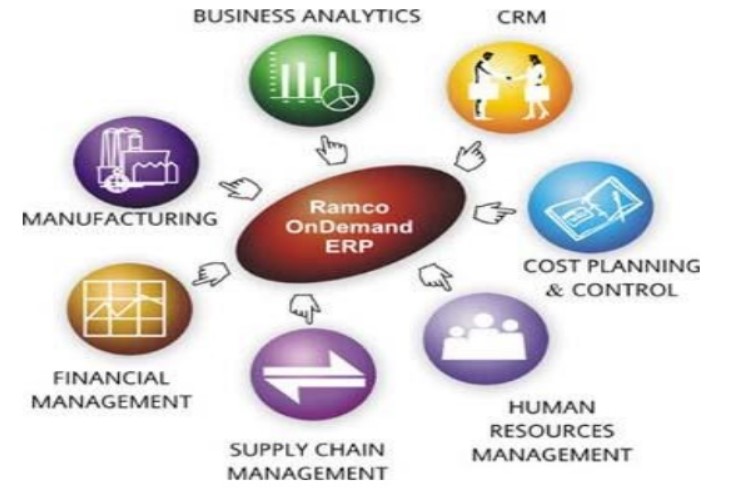ERP Modules Functions In today’s fast-paced business environment, Enterprise Resource Planning (ERP) systems have become indispensable tools for organizations aiming to streamline operations and enhance productivity. Initially designed to integrate various business functions into a unified system, ERP modules are continually evolving to meet the growing demands of modern enterprises.
Introduction to ERP Modules
ERP modules are specialized components within an ERP system that cater to specific business functions such as finance, human resources, supply chain management, and customer relationship management. These modules serve as the backbone of organizational processes, enabling seamless communication and data flow across departments.
Key ERP Modules Overview
Each ERP module plays a crucial role in managing different aspects of business operations:

Financial Management
The financial management module handles core accounting functions, including accounts payable/receivable, budgeting, and financial reporting. It ensures financial transparency and compliance with regulations.
Human Resources
HR modules streamline personnel management tasks such as payroll, employee benefits administration, performance evaluation, and training. They foster employee satisfaction and support strategic workforce planning.
Supply Chain Management
This module oversees the entire supply chain process, from procurement to distribution. It optimizes inventory levels, reduces costs, and improves supplier relationships through effective supply chain integration.
Customer Relationship Management
CRM modules centralize customer data and interactions, enhancing customer service, sales, and marketing efforts. They enable personalized marketing campaigns and facilitate customer retention strategies.
Expanding ERP Functionality
To remain competitive, organizations are expanding ERP functionality in several ways:
Adding New Features and Capabilities
ERP systems are continually updated with new features such as mobile accessibility, real-time analytics, and advanced reporting tools. These additions enhance system usability and meet evolving business needs.
Integrating with AI and Machine Learning
The integration of AI and machine learning technologies empowers ERP systems to automate routine tasks, predict trends, and provide actionable insights. This capability improves decision-making and operational efficiency.
Enhancing Usability and Accessibility
User experience enhancements focus on intuitive interfaces, customizable dashboards, and cross-platform compatibility. Improved accessibility ensures that ERP systems are user-friendly and accessible from various devices.
Benefits of Expanded ERP Modules
The expansion of ERP modules offers several benefits to organizations:
Improved Efficiency and Productivity
Streamlined processes and automation reduce manual effort and errors, boosting overall efficiency and productivity across departments.
Better Decision-Making through Advanced Analytics
Access to real-time data analytics enables informed decision-making, proactive problem-solving, and strategic planning based on accurate insights.
Scalability and Flexibility
Expanded ERP systems can scale with business growth and adapt to changing market conditions, supporting organizational agility and resilience.
Challenges and Considerations
Despite the benefits, expanding ERP modules comes with challenges:
Implementation Complexities
Complex implementation processes require careful planning, resource allocation, and expertise to ensure successful deployment without disruptions to daily operations.
Training and Adoption
Employee training and change management are essential for ERP adoption. Ensuring staff proficiency and acceptance of new technologies is crucial for maximizing ROI.
Security and Data Privacy Concerns
Increased connectivity and data integration expose ERP systems to cybersecurity threats and regulatory compliance issues. Robust security measures and data privacy protocols are imperative.
Case Studies of Successful Implementations
Real-world examples illustrate the transformative impact of expanded ERP modules:
Company A: Transformation through Expanded ERP
By integrating advanced analytics and IoT capabilities into their ERP system, Company A achieved significant cost savings, improved supply chain visibility, and enhanced customer satisfaction.
Company B: Achieving Competitive Edge
Company B leveraged AI-powered CRM modules to personalize customer interactions, resulting in a substantial increase in sales conversion rates and market share.
Future Trends in ERP Module Expansion
Looking ahead, several trends are shaping the future of ERP systems:
Cloud Computing and ERP
Cloud-based ERP solutions offer scalability, flexibility, and cost-efficiency, enabling businesses to access real-time data and applications from anywhere.
IoT Integration
IoT devices integrated with ERP systems provide real-time data from sensors and connected devices, optimizing inventory management, predictive maintenance, and operational efficiency.
Predictive Analytics and ERP
Predictive analytics capabilities embedded in ERP modules enable proactive decision-making based on data-driven insights, anticipating market trends and customer preferences.
Conclusion
Expanding ERP modules beyond traditional functionalities empowers organizations to achieve operational excellence, drive innovation, and maintain a competitive edge in today’s dynamic business landscape. By embracing new technologies and enhancing system capabilities, businesses can streamline processes, improve decision-making, and foster sustainable growth.
Read More: Cloud-Based ERP vs. On-Premise ERP: Which is Better?